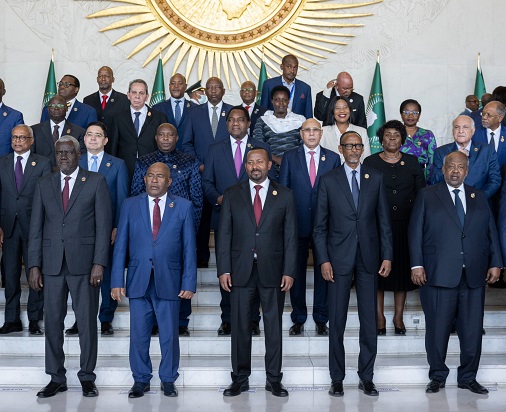The 37th Ordinary Session of the Assembly of the African Union has approved the naming of Coffee as a Strategic Commodity of the African Union in the 2nd Ten-Year Implementation Plan of Agenda 2063. This significant development was precipitated by a request from the Delegation of Uganda attending the meeting, in her capacity as Chairperson of the Specialised Technical Committee on Agriculture, Rural Development and Blue Economy.
The Uganda Delegation to the AU was led by Vice President, Jessica Alupo, Minister of Foreign Affairs, Jeje Odongo, Minister for Agriculture, Frank Tumwebaze and Permanent Representative to the AU Amb. Rebecca Otengo and Mr. Michael Wamai, Counsellor at the Uganda Mission Addis Ababa.
In another win for Uganda, the Assembly further took note of allthe recommendations made by the Heads of State and Government in the Kampala Declaration signed on 08 August 2023 at the 2nd G25 African Coffee Summit which was held in Kampala, under the theme “Transforming the African Coffee Sector through Value Addition”
Even though Africa is the origin of coffee, with the largest number of countries growing it, the coffee sub-sector in Africa is still encumbered by a number of interrelated structural constraints along the value chain, especially those pertaining to low farm level production and productivity, lack of value addition infrastructure and access to affordable finance. Worse still, these challenges have been further aggravated by the changing weather conditions caused by climate change together with pandemics and regional conflicts.
Despite the immense political and socio-economic ramifications in many countries, coffee had not been included in the agricultural transformation agenda of the African Union as a strategic crop. It was then agreed by the G25 coffee producers that a unified platform under the African Union in connection with a dedicated specialized agency requires support and strengthening to address the prevailing challenges and take advantage of the emerging opportunities.
The AU decision is a testament to the potential of Coffee to transform livelihoods in Africa, since it is the second most traded commodity in the world after oil, with an estimated value of USD 465 billion. Over 53% of the rural population of the 25 African coffee producing countries are involved in coffee growing and an estimated 10 million households derive a livelihood across the value chain.
To that end, therefore, theAssembly also agreed toappoint the Inter African Coffee Organisation as the AU designated agency responsible for coffee to work with the African Union Commission and member states on the effective transformation of the coffee value chain in Africa as part of the implementation of the AfCFTA strategy on boosting intra-African agricultural trade.
In the same vein, the Assembly decidedto hold a Special Summit in January 2025 in Kampala, Uganda to consider the post- Malabo Comprehensive African Agriculture Development Program (CAADP) implementation plan. Whilst the Assembly appreciated the proactive steps taken by the Commission to prepare the post-Malabo CAADP implementation plan ahead of the expiration of the Malabo CAADP declaration in 2025; it expressed concern about the slow progress made by the Member States in the implementation of the CAADP agenda as contained in the 4th CAADP biennial review report and calledfor accelerated implementation of the CAADP in the remaining two years.
The Assembly requested the AU Commission, AUDA-NEPAD, Regional Economic Communities (RECs) with the support of development partners to develop the 10-year post- Malabo CAADP implementation plan and organize the Special Summit. It is significant to note that these two decisions were adopted by the Assembly in recognition of the fervent call by H.E President Yoweri Kaguta Museveni, for African leaders to establish deliberate socio-economic programs aimed at economically empowering the people, especially the Women and Youth and ushering them into the money economy. Coffee is a low hanging fruit.























